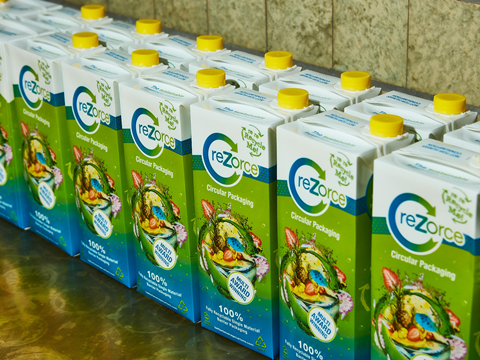
In a joint development agreement, Zotefoams and Refresco intend to conduct in-market trials for ReZorce, a mono-material packaging substrate for beverage cartons; and another partnership with Südpack hopes to produce up to 100 million ReZorce cartons every year.
ReZorce is a polymer sheet material made in layers, some of which contain microbubbles. It is manufactured using existing sheet extrusion processes, produced and filled on standard machines, and is available with different layer structures to suit a range of applications.
Compatible with surface printing processes, the high-barrier solution is designed to keep oxygen and water out, and to feel and fold like paperboard. It is also said to be fully recyclable using existing methods, and can contain up to 100% recycled content.
Zotefoams explains that current beverage cartons fall short of circular economy requirements, as they are multi-material structures containing paperboard, polymers, and sometimes aluminium. Because they are difficult to recycle, they often end up landfilled or incinerated.
As such, ReZorce is intended to tackle carton waste and keep up with the evolving regulatory landscape. It aims to look, feel, and perform like conventional carton solutions while improving their environmental impact and fitting into existing infrastructure.
It also aspires to be rollout-ready across the world. As Zotefoams explains, recyclate is “made into rolls of material for the packaging company who fill, make, and deliver the finished product to the supermarket shelves, and consumers recycle through their usual household collection to be separated and processed as usual before becoming a new carton.”
In a joint development agreement with independent beverage solutions provider Refresco, Zotefoams’ goal has been to develop ReZorce beverage cartons so they could be trialled at a major European retailer.
“The traditional beverage carton was launched in the 1950s and its design is fundamentally the same today,” said Neil Court-Johnston, president of Zotefoams’ MuCell Extrusion business unit, which produces the microcellular foaming technology to used to manufacture ReZorce. “The barrier properties of ReZorce lend themselves to a number of packaging applications but we chose to focus on beverage cartons because we could not see anyone, anywhere, trying to deliver circularity. With around 250bn beverage cartons used worldwide each year, this is a big problem.
“The annual Ellen MacArthur Foundation report is a stark illustration of the challenges FMCG manufacturers face in meeting their waste and carbon reduction targets, which can be attributed in part to the complex nature of some types of packaging. However, where beverage cartons are concerned, we believe ReZorce is the solution: peer-reviewed life cycle assessments show that a 1-litre ReZorce beverage carton uses half the energy and water required for a traditional liquid packaging board carton, and has a global warming potential that is 55% lower. What’s more, it meets all current and impending legislation driving towards a more circular economy.”
Currently, the companies are initiating quality and compliance testing procedures in an effort to bring ReZorce cartons into commercial production.
A new partnership between Zotefoams and Südpack is also anticipated to achieve a potential capacity of up to 100 million ReZorce cartons annually.
Dirk Hardow, chief executive, Functional Films & Compounds at Südpack, commented: “With our functional film, we will be contributing to the production of a packaging concept that will fulfil the requirements of the EU Packaging and Packaging Waste Directive in terms of recyclability and recycled content.”
Previously, SIG’s aluminium-free, full-barrier packaging material for aseptic cartons – nominated for a Sustainability Award in 2023 under the commercialized Climate category – received an award under Design for Circularity in the 4evergreen alliance’s Circularity Success Stories initiative.
The SIG DomeMini was subsequently released. This is an on-the-go, paperboard carton pack that sets its sights on the convenience of a plastic bottle while downsizing the pack and enhancing its recyclability.
Neil Osment, managing director of paper packaging industry analysts NOA, also spoke to Packaging Europe about barrier board’s role in plastic reduction efforts. He recommended the solution for chilled food, frozen food, ambient food, and dairy product packaging and anticipated that retailers would embrace it in the face of rising costs.
If you liked this story, you might also enjoy:
How are the top brands progressing on packaging sustainability?
The ultimate guide to global plastic sustainability regulation














No comments yet